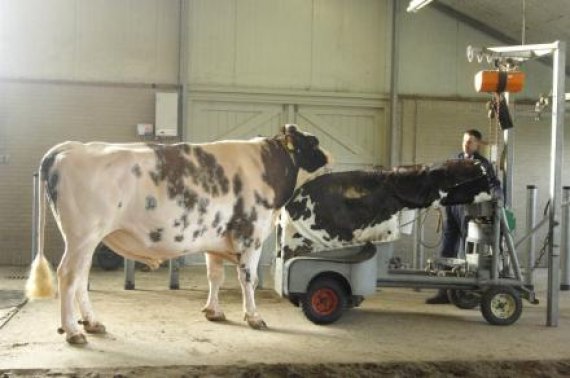*G*enomic selection is the key phrase for Breed4Food. Similarly to the plant breeding sector, the livestock breeding companies CRV (cattle), Topigs (pigs), Cobb (chickens) and Hendrix Genetics (chickens and pigs) are learning more and more about the genomes of farm animals. That has resulted in fast-growing datasets that can be used to link genes to desirable traits. In order to make sense of the data, the companies’ R&D departments need powerful computers, new statistical models and top scientists who are able to use the DNA information to come up with improved breeds. That costs a lot of money, which is why they have joined forces. The idea is that the collaboration between the companies and with the Animal Breeding & Genetics group at the university and Livestock Research at DLO will help them make faster progress than their international competitors in finding the sets of genes for desirable traits. Examples include animals that are less prone to illness and therefore need less or no antibiotics, or animals that are even better at converting feed into meat or milk. An improved feed conversion rate is better for the environment – fewer greenhouse gas emissions – and for farmers financially now that feed costs are rising due to higher cereal prices. The companies also want to breed beasts with the right behavioural traits. Having chickens that are less likely to peck out feathers or pigs that are less likely to bite tails is not only beneficial for their welfare; it also means less fall-out and less medication. These are all complex traits that are probably controlled by clusters of genes spread around the genome. If you are able to find a DNA network that leads to better resistance in pigs, for instance, then you probably also have the genetic key to robust chickens and cows as well. The breeding organizations hope in this way to learn from each other so that they will be able to select the most suitable animals more quickly. It is a long-term partnership, said R&D manager Mitch Abrahamsen of Cobb Europe. ‘Consumers won’t notice any difference for the first five to ten years.’ Breed4Food will mainly function as a virtual research centre for the next to two years – the breeding companies’ DNA scientists will stay put and exchange information with Wageningen UR and each other online. The aim is to have an R&D centre on the Wageningen campus in five years’ time with around 50 breeding scientists, said R&D director Ate Lindeboom of CRV. The amounts the five participants are investing in the partnership were not disclosed. Breed4Food is part of the Agrifood top sector. The initiators’ application for funds will probably be granted but it is not yet clear how many euros the Ministry of Agriculture will be giving the new consortium.
Breeding scientists to join forces in hunt for genes
Wageningen UR will be collaborating with four breeding organizations in an effort to find the genetic basis for complex traits in dairy cows, chickens and pigs. They signed the agreement for the Breed4Food top scientific institute last Monday, 3 September.

